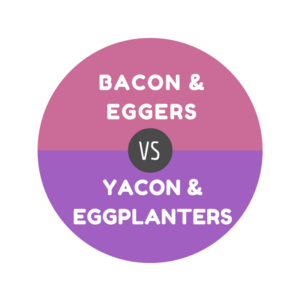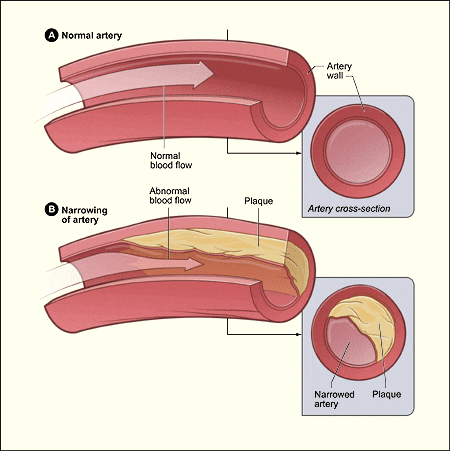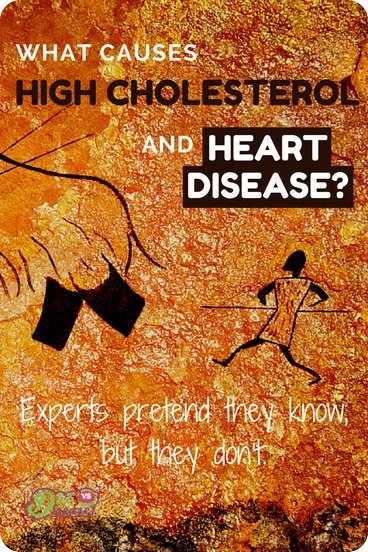[Last updated 29th September, 2017]
“The only true wisdom is in knowing you know nothing.” – Socrates, Greek philosopher.
I have a confession to make.
When I first wrote this article it had a completely different title and angle.
It attempted to explain why cholesterol is not related to heart disease risk, somewhat supportive of the Cholesterol Myth mindset.
I found this to be true of myself, regularly eating so-called high cholesterol foods with little change to my blood readings. That is, as a healthy young adult.
The original article was to be titled:
What Causes High Cholesterol? The Outdated Question That Will Kill You.
However, after spending days – if not weeks – going over the research, I was forced to admit the current evidence is far from conclusive.
To make absolute statements about cholesterol and disease seemed irresponsible as a health professional, maybe even unethical.
I’d be no different to the popular diet advocates and “experts” we’re inundated with today…. Often fostering a culture of pseudo-science, orthorexia and, well, ignorance.
In writing my original article, I realised that just because one particular way of eating works well for me, doesn’t mean it will for you.
Nutrition has never been a one-size-fits-all hat, and never will be. And it’s most certainly true of cholesterol and heart health.
In a hurry? Skip down to the header So then… What causes heart disease?
What causes high cholesterol? Let’s presume animals foods do

Researchers and medical professionals continue to disagree about what causes high cholesterol and heart disease.
This has been further complicated by the rising occurrence of logical fallacy (error of reasoning) in popular health communities.
The problem is that either side of the cholesterol debate can be supported by cherry-picking evidence that fits. Strong opinions and even movements have formed as a result.
In other words, any food or diet or nutrient can be made to look good or bad. That’s the reason kale is so unhealthy.
So, does the cholesterol humans eat affect the long-term levels of cholesterol in the blood, or not? The current evidence cannot tell us for certain, but I do have an answer for you further down (1).
For the purpose of this article, let’s presume the intake of animal fats (cholesterol and saturated fat) does lead to higher levels of cholesterol in the blood. Otherwise the entire argument between animal fats and heart disease becomes rather pointless.

Dietary cholesterol must impact blood cholesterol in order to form the link between animal fats and heart disease.
Presuming animal fat does affect blood cholesterol allows us to focus on the true question- does consumption of animal fats increase heart disease risk?

Summary: Medical professionals continue to disagree about the link between dietary cholesterol, blood cholesterol and heart disease. For argument’s sake, let’s presume animal fat consumption does impact blood cholesterol.
Bacon and Eggers vs. Yacon and Eggplanters: Two sides of the cholesterol argument

Those who follow lower-carbohydrate diets such as Atkins and Paleo generally believe animal fats in the diet do not raise blood cholesterol levels and/or heart disease risk.
As they limit carbohydrate intake, by default, their diets must be higher in fat and protein than what is considered “normal”. Typically, the additional fat and protein is sourced from animal foods like meat and dairy.
For the (light-hearted) purpose here, I’ll refer to these people as Bacon and Eggers.
On the other side of the cholesterol coin is the conventional wisdom folks.
These people tend to subscribe to the “Diet-heart hypothesis”; the idea that dietary cholesterol and saturated fat raises blood cholesterol, which in turn contributes to the risk of heart disease (2).
Supporters of this mindset typically follow a moderate-high carbohydrate diet, and generally includes vegetarians, vegans, and everybody following classic dietary guidelines.
I’ll refer to these people as Yacon and Eggplanters.
I’ve done my best to critique their arguments as objectively as possible… I’ve got no dog in this fight.
For my examples, I’ve simply presented a few popular and commonly cited studies. Covering all studies and opinions would take months, and possibly drive me insane.
I intentionally did not call-out or link to particular researchers or diet advocates with strong opinions on this matter. Many – of whom I greatly respect – are doing important work in nutrition science, regardless of their opinions.
Prepare to be confused by the cholesterol argument.
Summary: This first part of this article critiques the arguments commonly presented by both sides of the cholesterol/heart disease debate. The aim is to illustrate how a convincing “scientific” case can be made from either perspective, fuelling public confusion.
What do the observational studies tell us?

While observational studies cannot be used to prove cause and effect, they certainly hold great value in scientific research. There are four main types, all of which observe and gather data on a phenomenon that’s already happening.
For example, patterns of olive oil consumption in Europe; populations with the lowest osteoporosis rates; and in this case, cholesterol consumption and heart disease deaths.
The following are commonly cited examples in the cholesterol argument. This type of evidence is often used to support the case of Bacon and Eggers, so I’ll put them first.
Bacon and Eggers say:
The longest running and arguably greatest study on heart disease, the Framingham Heart Study found that cholesterol intake had no correlation with heart disease. The study began in 1948 and is now in its third generation of participants (3).
After more than 20 years of research, authors at the time concluded, “There is, in short, no suggestion of any relation between diet and the subsequent development of CHD in the study group” (4).
Rumour has it they were so disappointed with the finings that they never formally published all the results.
Another large observational study with over 47,000 Japanese participants observed that those with the lowest cholesterol had the highest death rate, and those with high cholesterol had the lowest death rates (5).
The study authors noted, “The highest death rate observed was among those with lowest total cholesterol (under 160 mg/dl or 4.14 mmol/L); lowest death rate observed was with those whose cholesterol was between 200-259 mg/dl (5.17-6.70 mmol/L).”
If having high cholesterol is so dangerous, why did those people have the lowest death rates?
To round it out, a study of 997 elderly participants published in the Journal of the American Medical Association has found cholesterol levels have little importance to heart health.
The results indicated that high LDL cholesterol is not a risk factor for coronary heart disease (CHD), heart-related deaths, or death from any other cause for that matter (6).
Those studies are just the tip of the iceberg. Many more have been unable to find a link between cholesterol and cardiovascular health.
Yacon and Eggplanters say:
On the website of Framingham Heart Study, it states:
“Over the years, careful monitoring of the Framingham Study population has led to the identification of the major CVD risk factors – high blood pressure, high blood cholesterol, smoking, obesity, diabetes, and physical inactivity…”
In line with this current position statement, the risk calculator on the Framingham website appears to increase the risk for those with higher cholesterol levels.
If cholesterol doesn’t matter, why is it used as a factor?
While the results of the Japanese study are interesting, it cannot be used to draw any conclusions. An observational study of that magnitude cannot possibly identify the factors which were and were not responsible for changes in heart disease risk.
There could be hundreds of possible reasons why the group with high cholesterol had lower rates of death; reasons which may have superseded the harmful effects of high cholesterol. Age and genetics spring to mind first.
As for the study on elderly individuals, the focus is on cholesterol as a risk factor for death in people older than 70. That means the authors’ conclusions do not and cannot apply to anybody younger than 70.
What’s more, 70 and older is just about average life expectancy. Thus, there are many other factors – more influential than high cholesterol – which could cause death in this age group. In other words, high cholesterol is unlikely to be the greatest health risk at that point in a person’s life.
So in actual fact, the study does not confirm that high cholesterol carries no risk, or even that it is no longer a risk factor after the age of 70.
Rather, all it can tell us is that people over 70 are at no greater risk of dying from cholesterol-related heart disease than anything else.
Summary: You can see how two opposing sides of the cholesterol debate use the SAME evidence to suit their ideas. The findings and conclusions of many disease studies can be worded and cherry-picked to support a particular agenda or specific point of view. On the other hand, because of the nature of observational studies (not proving cause and effect), it’s easy for those arguing to dismiss the evidence as weak.
What do the clinical trials tell us?

With clinical trials, researchers can investigate cause and effect by intervening with participants.
The best-designed studies randomly divide participants into at least two groups: those who get the intervention (i.e. treatment) and those who don’t (i.e. placebo or control).
Much of this type of evidence is used to support the case of Yacon and Eggplanters, so I’ll put them first.
Yacon and Eggplanters say:
It is common knowledge that consistently high LDL cholesterol levels is strongly linked with heart disease (7, 8).
Numerous clinical trials that use egg-feeding (a concentrated source of cholesterol) have demonstrated egg consumption increases LDL cholesterol in the blood.
In a 3-week double-blind crossover study of 17 lactovegetarians (who did not have high cholesterol), the addition of one large egg per day to the diet raised LDL cholesterol by 12% (9).
The eggs also raised ApoB by 9%, a marker of the number of LDL particles (LDL-p) in circulation. Each LDL particle has one ApoB; thus the higher the number ApoB, the higher the number of LDL particles.
Both sides of the cholesterol argument tend to agree that high LDL particle number is bad for heart health, one way or another (10).
Additional studies adding 6 eggs per day to the diet of healthy participants found that LDL cholesterol increased by 21%, and ApoB by more than 30% (11, 12).
There are many other studies that show dietary cholesterol increases LDL cholesterol and ApoB; too many to list here.
It’s evident that foods containing cholesterol – in other words, animal foods – increases LDL cholesterol and LDL particle number. Therefore, they increase risk of heart disease.
Bacon and Eggers say:
The clinical trials mentioned above only show acute (short-term) effects. What about over the long-term? Additionally, those study conclusions are limited by their small number of participants.
It’s now understood that at least 70% of people experience little to no changes in their blood cholesterol – including LDL cholesterol – from eating eggs (13, 14).
This suggests that cholesterol –at least from eggs – has little to no impact on circulating LDL, and therefore no impact on heart health.
And while egg consumption can increase LDL in the remaining 30% of people, it also increases HDL cholesterol, which is protective of heart health (7).
In other words, increased HDL levels seem to offset any dangers of increased LDL levels. That’s why zero studies to date can prove animal foods, such as eggs, cause heart disease (15, 16).
Clinical trials have also shown that replacing carbohydrates with fats and proteins (also known as a low-carbohydrate diet) effectively reduces ApoB, and therefore reduces the harmful LDL particle number (17, 18).
These findings indicate that consuming animal foods in place of carbohydrates is beneficial to heart health, not dangerous.
Summary: Each side of the debate can cite clinical trials and review studies which confirm their ideas about cholesterol and heart disease. Clinical trials are usually both difficult and expensive to run, which often restricts sample size and study length. For these reasons and more, different studies have found completely contradicting results. It’s simple to select studies that support your idea, but in doing so you’re choosing to ignore the remaining evidence.
Are you confused? So am I
As you can see, it’s not overly difficult to highlight studies to support a particular point-of-view.
In other words, you choose to see what you want to see.

This is why the cholesterol debate remains a confusing mess.
Those concerned with animal foods could copy evidence here to support their case. Likewise, those with opposing views can do the same.
I haven’t even touched on anecdotal evidence (casual observation) or historical opinions, both of which overrun blogs and social media right now.
We’d be here for weeks if I included both sides of Ancel Keys’ Seven Countries Study, or what our hunter-gatherer ancestors ate.
Who’s right in the end?
Everybody and, perhaps much more correctly, nobody.
Summary: There is a lot of evidence to support both sides, which is what makes the cholesterol-heart disease debate so confusing. But to say that one way of eating is absolutely correct is, well, misleading and certainly not evidence-based.
So then… What causes heart disease?
Heart disease is the biggest killer in the Western world (19).
It’s no wonder that prevention is a hotly debated topic, particularly cholesterol and saturated fats.
But let’s take a step back and look at what we do know about heart disease. For sure.
Stiffness and formation of plaque in the arteries, known as Atherosclorosis, is in essence what drives heart disease.

Just like wrinkled skin or stiff joints, it happens over time, with age, so there is no preventing it.
I’m not saying you will have a heart attack from blocked arteries, but arterial damage does occur in old age. That’s life.
Fortunately, we can (for the most part) determine if our atherosclerosis will be minor or severe. This is achieved by the way we live our lives.
To simplify, it really comes down to lifestyle and diet.
Does cholesterol still matter?
What we do know is higher levels of LDL cholesterol is associated with an increased risk of heart disease (20).
Likewise, cholesterol-lowering therapy has been shown to reduce the risk of heart disease.
We also know that higher levels of HDL cholesterol appear to protect heart health to some degree (21).
Maybe the LDL particle is the cause of damage. Maybe the HDL particle is there to protect against damage. From the current evidence available, we just don’t know for sure.
Therefore, overall we know that reducing LDL cholesterol is most beneficial.
Consider this analogy:

Driving at high speeds (high LDL) increases the chance of death. But, wearing a seat belt (high HDL) protects against chance of death. Reducing your speed (lowering LDL) also reduces your chance of death.
Even with your seat belt on as a precaution (high HDL), your chances of survival are greatly improved if you drive at a slower speed (lower LDL).
Therefore, based on what we do know, it’s ideal to keep LDL cholesterol from becoming too high. Regardless of your HDL levels. Just to be on the extra safe side.
And that brings us back full circle to the original question, What causes high cholesterol?
Or rather, perhaps the question should be What causes high (LDL) cholesterol for you?
Summary: A large build-up of plaque in the arteries, known as Atherosclerosis, is the main driver of heart disease. It is strongly linked with higher LDL levels. If you want to be on the safe side, it’s ideal to keep LDL cholesterol from becoming too high, regardless of your HDL levels.
The unsexy, unprofitable conclusion that will never make headlines
Experts can all agree that cholesterol still matters.
The key message to remember, however, is that our vulnerability to cholesterol-rich foods varies greatly between individuals.
In fact, this is true in many aspects of nutrition.
Some react poorly to lactose or gluten. Others don’t.
Some react poorly to low-fat diets. Some react poorly to low-carb diets.
If animal foods or saturated fats increase your blood cholesterol – particularly LDL cholesterol –then it’s safest to limit your intake. If they don’t have any effect, eat them how you please.
That’s it.
It’s not a conclusion that promotes weight loss diets.
It’s definitely not a statement that sells cook books.
It’s not even an attitude that can leverage my personal brand.
All it is, is a conclusion based on the weight of scientific evidence.
If you plan to change your eating habits to improve metabolic health – particularly adding or eliminating food groups – do it sensibly:
- As a baseline measurement, go to the doctor and first have a blood test.
- Research the “diet” thoroughly, maybe even get a health professional’s opinion.
- Don’t try to change everything at once.
- Despite how you’re feeling, return in 1-3 months to have another blood test, just in case. Go from there.
When it comes to cholesterol intake and heart disease risk, it’s best to play it safe. There’s so much we still don’t know or understand.
Anyone who says otherwise is simply guessing.
At least that, we do know.
Photo sources: Tom Wigley- Nested Animals, Jamie McCaffrey- Looking into the past, Taylor Bennett- #278, NHLBI

